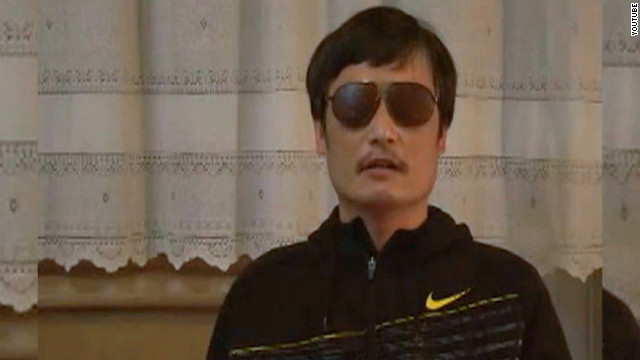
- NEW: Chen Guangcheng has left the U.S. embassy for a medical facility
- He escaped house arrest and fled to Beijing last week
- Chen is now "making Washington uncomfortable," a Chinese newspaper says
- Hillary Clinton arrives in Beijing ahead of scheduled talks on economics and strategy
Hong Kong (CNN) -- The escaped Chinese activist whose refuge at the U.S. Embassy in Beijing prompted a flurry of diplomatic activity between the United States and China has left for a medical facility.
The news Wednesday came hours after the arrival in Beijing of U.S. Secretary of State Hillary Clinton, whose scheduled meetings with senior Chinese leaders were in danger of being overshadowed by Chen Guangcheng's presence in the embassy.
Chen will receive treatment at the facility in the Chinese capital and be reunited with his family, a senior U.S. official said.
The Chinese foreign ministry is demanding an apology from the United States over Chen's entry into the embassy, the state-run Xinhua news agency said.
Xinhua said the activist spent six days at the embassy and "left of his own volition."
Clinton and Treasury Secretary Timothy Geithner are due to hold talks with their Chinese counterparts in Beijing starting Thursday about strategic and economic issues.
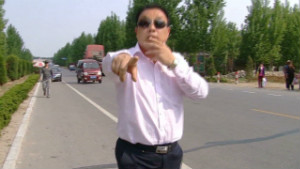 CNN chased out of dissident's village
CNN chased out of dissident's village  Diplomat: U.S. must protect dissident
Diplomat: U.S. must protect dissident  China-U.S. tension at 20 year high
China-U.S. tension at 20 year high Chen, a blind, self-taught lawyer, evaded guards who had kept him under house arrest for more than 18 months in a small eastern village. He was confined to his home after serving four years in prison, apparently over his legal advocacy for what he called victims of abusive practices such as forced abortions by China's family planning officials.
He made his way to Beijing on April 22, moving from safe house to safe house before finding refuge at the U.S. Embassy. Friends and fellow activists had raised concerns about his health.
The situation presented a complex test for the Obama administration's approach to relations with China, creating a strain between upholding human rights and maintaining steady ties with Beijing.
Publicly, the U.S. and Chinese authorities had skirted around the subject of Chen before Wednesday.
President Barack Obama stayed tight-lipped on the matter when asked about it on Monday, saying simply that "every time we meet with China, the issue of human rights comes up."
An editorial published Wednesday on the English language website of the Global Times -- a sister publication of the People's Daily, which is the ruling Communist Party's official newspaper -- addressed the subject of the activist.
"In the Western media, Chen is a hot potato for Chinese authorities," the newspaper said. "Now he is making Washington uncomfortable."
It sought to play down the situation's significance for U.S.-Chinese relations, saying the talks this week are "unlikely to dwell on him."
But many activists and commentators have underscored the importance of the issue.
"This is a pivotal moment for U.S. human rights diplomacy," said Bob Fu, president of ChinaAid, a Texas-based Christian human rights organization. He was quoted in a ChinaAid statement Sunday.
The situation was all the more complicated for Clinton, who has advocated Chen's case in the past.
After her arrival in Beijing on Wednesday, she went straight to her hotel without briefing reporters. She has no official engagements until a dinner in the evening with State Councilor Dai Bingguo, a senior foreign policy leader in China.
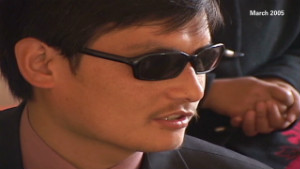 Turmoil and intrigue bubble in China
Turmoil and intrigue bubble in China 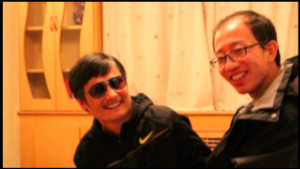 Where is blind Chinese activist Chen?
Where is blind Chinese activist Chen? 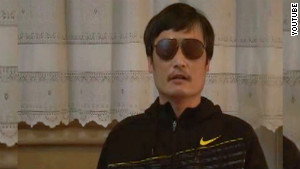 Escaped blind activist recounts abuse
Escaped blind activist recounts abuse Chen's flight from detention comes at a highly sensitive time for Chinese authorities. The Communist Party has been rocked by a scandal involving former high-ranking leader Bo Xilai, whose wife is under investigation in relation to the mysterious death of a British businessman in the southwestern metropolis of Chongqing.
The downfall of Bo, the former Chongqing party chief who is now being investigated in connection with serious disciplinary violations, has created shock waves ahead of a once-in-a-decade leadership transition in China that is due to unfold this year.
Chen, 40, addressed Chinese Premier Wen Jiabao in a video posted Friday on YouTube, detailing "cruel" abuses he said he and his family had suffered at the hands of authorities during months of heavily guarded detention in their home.
"They broke into my house, and more than a dozen men assaulted my wife," he said. "They pinned her down and wrapped her in a comforter, beating and kicking her for hours. They also similarly violently assaulted me."
Journalists and supporters were prevented from visiting Chen during his house arrest. One of those supporters is Hollywood actor Christian Bale, who was roughed up by security guards while attempting a visit in December.
A local court sentenced Chen to four years and three months in prison in 2006 on charges of damaging property and "organizing a mob to disturb traffic" in a protest, charges that his supporters called preposterous.
Since his September 2010 release from prison, he had been confined to his home along with his wife, mother and daughter.
Chen's escape appears to have angered local officials holding him captive, with supporters saying that at least four members of his family have been detained.
In the YouTube video, the activist appealed to the Chinese premier to investigate his case and expressed concern about the welfare of his wife, mother and daughter.
"Although I'm free, my worries are only deepening," he said. "They have been persecuting my family for a long time, and my escape would only prompt them into a mode of revenge."
CNN journalists who attempted to visit Chen's home village of Dongshigu in Shandong Province on Tuesday were followed and harassed by men in an unmarked car.
The authorities' reaction also seems to have ensnared some of Chen's supporters, especially those suspected of aiding his escape.
CNN's Jethro Mullen, Jaime FlorCruz, Stan Grant and Steven Jiang contributed to this report.


